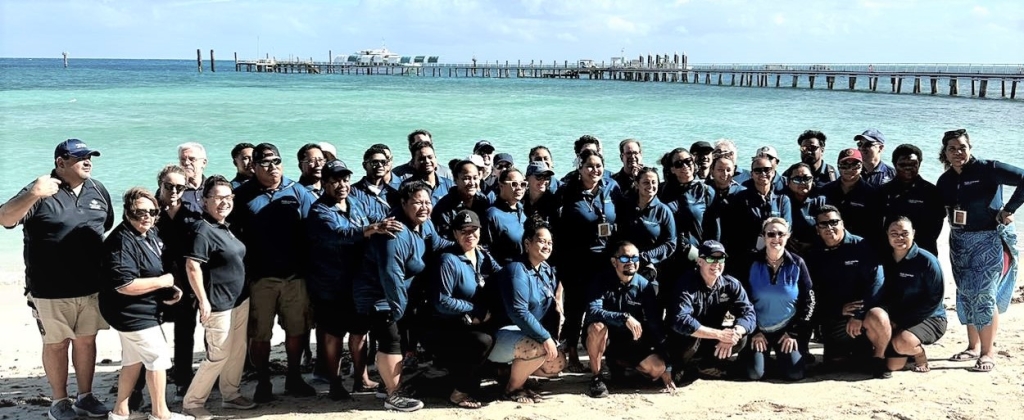
10 August 2023, Cairns Australia - Thirty-five coral reef managers from 14 Pacific countries have returned home inspired to continue their work to protect reefs across the region having been in Australia learning from and sharing their knowledge during the inaugural Pacific Coral Reef Collective.
Hosted in Cairns, the week-long Pacific Coral Reef Collective was a partnership between the Secretariat of the Pacific Regional Environment Programme (SPREP) and the Government of Australia, through the Great Barrier Reef Marine Park Authority (Reef Authority), to share challenges facing coral reefs and collectively explore the innovative solutions being implemented to improve reef resilience.
Ms Temukisa Siale, of Tuvalu, who undertakes coral restoration on two of her country's main islands, was amongst the participants from American Samoa, the Cook Islands, Federated States of Micronesia, Fiji, Kiribati, Marshall Islands, Nauru, New Caledonia, Palau, Papua New Guinea, Samoa, Tonga and Vanuatu, who have benefitted from the programme.
She told ABC Australia that she was inspired to become involved in reef management after seeing the devastating impact climate change had on coral reefs around her home.
"It's really important,” she said about the protection of the reefs. “I'm passionate because I want my children, my grandchildren, and the future generation of Tuvalu to be able to still see the beautiful island that we have, the beautiful culture that we have."
The Pacific delegates received a warm welcome to country by Mr Gavin Singleton, of Yirrganydji and Gudju-gudju and Mr Seith Fourmile of Yidinji, as well as from their Australian hosts, the Reef Authority, at the start of the programme.
The CEO of Reef Authority, Mr Josh Thomas, said the Reef Collective was a great opportunity for knowledge sharing and leadership exchange.
“Together, sharing our experience, knowledge and cultural histories we’ll be able to do better by the marine environment for generations to come,” he said. “The diverse programme of actions across the Pacific and on the Great Barrier Reef to strengthen reef resilience will provide a stimulating context for collective discussions about how we can better protect our precious marine ecosystems.
“I would like to extend my thanks to the Secretariat of the Pacific Regional Environment Programme for its assistance in making this week possible. The wealth of knowledge and experience gathered in Cairns for this event is incredible.”

The Special Envoy for the Great Barrier Reef, Senator Nita Green, reminded everyone that the Pacific is home to 27% of the world’s corals spread over vast areas.
“And these reefs are among the most biodiverse on the planet. They support not only communities and territories they surround but they are recognised globally for their contribution to tourism, industry and heritage values,” she said.
“The Pacific community has a wealth of knowledge and experience to share as we seek to address challenges that confront coral reefs throughout the world which is why gatherings like this are so important. Know the Reef Authority has been working really closely with reef traditional owners and partners across government, research, and industry to deliver this Pacific Coral Reef Collective and I want to say thank you to all of those people involved.”
SPREP Coastal and Marine Ecosystem Adviser, Dr. Peter Davies, said the knowledge exchange in Australia was critical to ensure the proper management of reefs across the Pacific region, both now and in the future.
As part of the implementation of the Pacific Coral Reef Action Plan 2021–2030, SPREP is working with our partners in the region to improve the region’s access to the best available science and knowledge on current reef management practices.
The Great Barrier Reef is recognised globally for its beauty and diversity and is listed as a World Heritage site for its Outstanding Universal Value. Like other coral reefs, it is under pressure from an accumulation of threats, with climate change the greatest among them.
PHOTO CREDIT: Great Barrier Reef Marine Park